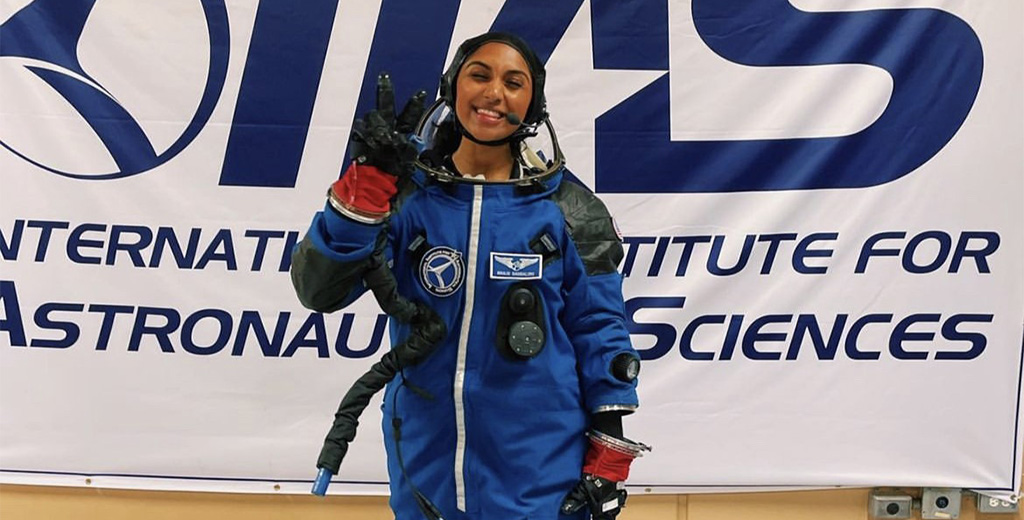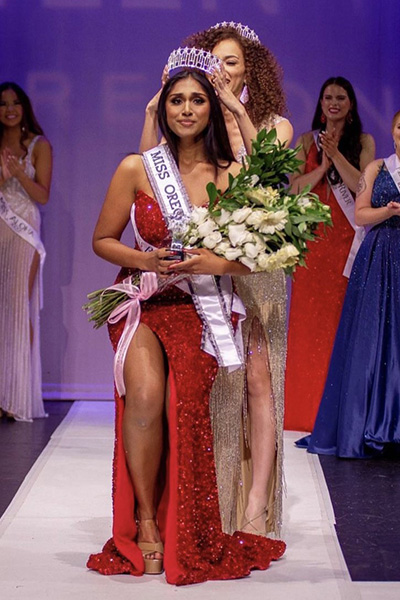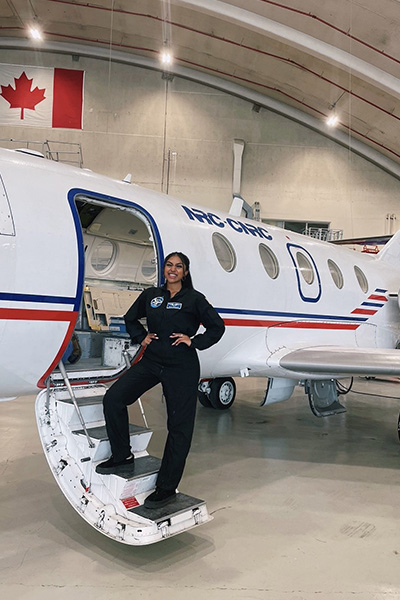
From ball gowns to space suits, and everything in-between
Manju Bangalore, BS ’18 (physics), wants to leave the world better than she found it.
She grew up in Corvallis, shadowing her South Indian immigrant parents in an agricultural seed-testing lab. The family worked twelve-to-eighteen-hour shifts without access to childcare. It was in that lab that Bangalore began to develop a passion for education in science, technology, engineering, and math (STEM). This led her to the University of Oregon, then the runway, where she won the title of Miss Oregon USA in 2022.
Today, as a “multi-hyphenate”—one with several professions or skills—whose accomplishments include five NASA internships, a White House internship, a feature in the 2022 Sports Illustrated swimsuit issue, a children’s book, working with Beyoncé on the set of her 2019 “Brown Skin Girl” music video, running two nonprofits, and more, the aspiring astronaut’s most recent achievement was competing for the title of Miss USA during the September 2023 program. Now, Bangalore is taking a well-deserved hiatus from pageantry to refocus on professional development and her many advocacy efforts.
 “Preparing for Miss USA was honestly one of the hardest things I’ve had to do,” Bangalore says. “I feel much more at ease and at peace now that it’s over, and I’m genuinely just really excited for what the future holds, especially between my scientist astronaut candidate training, my acting, and running my nonprofit Operation Period.” Operation Period advocates for menstrual justice around the world.
“Preparing for Miss USA was honestly one of the hardest things I’ve had to do,” Bangalore says. “I feel much more at ease and at peace now that it’s over, and I’m genuinely just really excited for what the future holds, especially between my scientist astronaut candidate training, my acting, and running my nonprofit Operation Period.” Operation Period advocates for menstrual justice around the world. Meeting with coaches several times per week for competition preparation proved time-consuming, making it difficult for Bangalore to navigate work-life balance and other priorities, including pursuit of a master’s degree in aerospace engineering at the University of Southern California. Preparing for a contest of the caliber of Miss USA requires regular exercise, specific attention to nutrition, planning a wardrobe, runway walking practice, and interview coaching. But competing for the crown, Bangalore says, was “one of those things where you know it’s a once-in-a-lifetime opportunity, so you’re willing to make some sacrifices.”
Bangalore’s favorite part was preparing for the interview, which is worth up to 50 percent of a candidate’s total score. Interviewing requires confidence, poise, and adherence to a strong set of values. Unfortunately, Bangalore was eliminated in the first half of the competition due to what she believes was biased judging.
“I was told that there were going to be no political questions, and then most of my interview was political,” Bangalore says. “Something that I’m really proud of and that I included in my judge’s paperwork is that, at the age of seventeen, I advocated to ban conversion therapy on LBGTQ+ minors in Oregon . . . [and] two of the judges very quickly displayed transphobia while I was talking about it. The fact that it was turned into this very political, heated moment about how trans kids don’t deserve access to healthcare or resources was very frustrating, so that was something that I was not expecting and something that I think contributed to my overall score.”
It wasn't the first time that the pageant structure conflicted with Bangalore's own values. Something she is passionate about is embodying the power of being a multi-hyphenate in her pursuit of the many interests and causes that she finds fulfillment in—which is not an attribute that's always understood by others.
“I’ve gotten comments like ‘your life is too complex to convey on the judge’s paperwork’ or ‘it’s not linear and we need to leave things out,’” Bangalore says. “I’ve chosen not to take that advice . . . and it’s done me more good than harm. I was honest about who I am and what I’ve been able to accomplish, and I won Miss Oregon USA.
One place where her multidimensionality shines is her activism, which includes gun violence prevention, justice for survivors of sexual assault, menstrual freedom, LGBTQ+ rights, STEM education, and more.“[It] was the first time that I didn’t water myself down, and it worked out in my interest. When I talk about being a multi-hyphenate, there's also an aspect of being a multidimensional person and how we are not just one thing in both our careers and our identities as people.”
“What’s empowering for me is that my voice matters,” Bangalore says. “I think that, a lot of times, when we think of these social or political issues, we think that they’re too large for us to make an impact in. We’ve seen time and time again across history that that’s just not true, and that specifically young people have led a lot of these fights for progress and for social change.”
Driven by this idea of social change, Bangalore won Miss Oregon USA on her third attempt at the crown. As someone who grew up in a predominately White town where she encountered xenophobia and racism daily, that crown served as a challenge against Eurocentric beauty standards, as well as validation for other women and girls of color.
“I hope me winning the title of Miss Oregon USA has made little girls of all backgrounds feel a little more comfortable in who they are and has made adults of all backgrounds understand that beauty doesn’t come in one shape or size or color, especially in the state of Oregon where that has been the metric for such a long time,” Bangalore says.
Despite all her accomplishments, there were many moments in Bangalore’s past where she suffered from mental health and body image issues. Now twenty-six, she doesn’t want the glitz and glamour to overshadow the hard work she’s done to get to this point—professionally, but also personally. Bangalore is intent on shedding light on the reality that her confidence and poise has been years in the making.
“It wasn’t until I got access to medication, had a good psychiatrist and therapist, and found a loving community that I was able to really enjoy the path of self-confidence and self-love,” she says. “You have to ask for help at some point because if you don’t, you’re denying yourself basic dignity. I know that sounds kind of harsh, but it really is up to us to reclaim our health and our strength. For so long I sat there and thought my mental health was out of my control, that it’s a chemical imbalance . . . but I think that also takes agency and autonomy away from ourselves when we frame it that way.”
One place that propelled and nurtured her self-growth was the UO, where physics professors Scott Fisher and Stephanie Majewski and staff member Dr. Josh Snodgrass were among those who went above and beyond to support her.
“When people ask me ‘how are you able to do everything?’ my answer is that I’m the product of every person who has poured into me, and I owe a lot of that to the UO faculty,” Bangalore says. “UO was very formative for me in that so many faculty and staff both invested in me and protected, cared for, and supported me in a way I don’t think would have happened elsewhere.”
 The UO and the physics department have helped Bangalore achieve her multi-hyphenate status, succeed in her goals, and attain life-changing opportunities. Happiest in a space suit, she says one of her favorite experiences was during her second NASA internship with the Johnson Space Center. While co-leading the 2018 March for Our Lives protest in Houston, Bangalore was simultaneously working with some of the biggest names in space, including astronauts Suni Williams and Victor Glover.
The UO and the physics department have helped Bangalore achieve her multi-hyphenate status, succeed in her goals, and attain life-changing opportunities. Happiest in a space suit, she says one of her favorite experiences was during her second NASA internship with the Johnson Space Center. While co-leading the 2018 March for Our Lives protest in Houston, Bangalore was simultaneously working with some of the biggest names in space, including astronauts Suni Williams and Victor Glover. “They’re my heroes and so getting to work with them was very pivotal for me because I went from looking up to them, to working with them, to then training them on the Orion spacecraft and how to operate it,” Bangalore says. “I was twenty—I was young—so I think just looking back at that moment it’s like, ‘I really did it.’”
Now that Miss USA is over, Bangalore has more time for the little things in life like hanging out with friends, watching movies, enjoying the great outdoors, and playing with her two dogs, Murphy and Charlie.
But she still has big plans for the future. Operation Period recently launched the Youth Institute for Menstrual Freedom, through which ten fellows are mentored and receive $1,000 to lead a community-based project in their region. Bangalore is also waiting to hear if a TV pilot she was booked for this year will get picked up.
“I’m just genuinely happy in everything I’m doing,” Bangalore says. “It’s been a combination of good luck and hard work that I’ve built a life that not only am I proud of, but I genuinely enjoy. I have so much time to go explore the world now . . . maybe I should try pottery or something.”
—By Sage Kiernan-Sherrow, UO Alumni Association copywriter/editor

